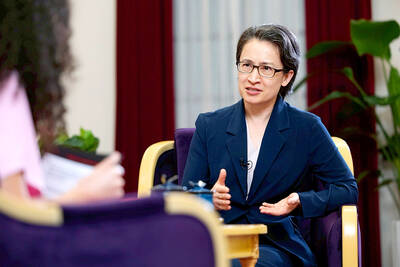The Central Epidemic Command Center (CECC) yesterday reported no new cases of COVID-19, while expressing its gratitude to mask manufacturers for meeting domestic demand and producing extra for nations in need.
Yesterday marked the 51st day without a domestic case being reported, while 427 infected people have recovered and been released from isolation, said Minister of Health and Welfare Chen Shih-chung (陳時中), who heads the center.
About 100,000 new cases are diagnosed around the world every day, so as Taiwan gradually eases disease prevention regulations, everyone must continue to practice personal protective measures, he said.
The center would continue to bolster the nation’s medical preparedness and responsiveness, but the healthcare system has achieved its three main goals in the fight against COVID-19, Chen said, while Deputy Minister of Health and Welfare Hsueh Jui-yuan (薛瑞元) added that the goals were “reducing the speed of virus transmission,” “safeguarding core personnel to maintain healthy healthcare operations,” and “reducing severe cases and deaths.”
“To slow the spread of the coronavirus, turnaround for test results and hospital admissions for people with confirmed infections must speed up, so the CECC is continuing to expand testing capacity — the nation now has 45 designated testing facilities that can conduct 5,900 tests per day, with the results available in 24 hours,” Hsueh said.
There are 4,169 hospital beds — 963 negative pressure isolation wards, 1,031 isolation wards and 2,175 specialized wards — that can be used for confirmed cases, Hsueh said, adding that there are also 27 centralized quarantine facilities and temporary negative pressure isolation chambers that can be set up for additional admissions.
To prevent the healthcare system from becoming overwhelmed, the center needed to maintain a certain number of healthy healthcare practitioners — as they are the most important front-line defense — so it announced in late February the controversial ban against healthcare personnel traveling abroad, he added.
So far, 10,194 healthcare practitioners have applied for government compensation following the policy, claiming about NT$82.39 million (US$2.75 million), Hsueh said, adding that if all of these people had been put under a 14-day quarantine after returning from abroad, it would have had a considerable effect on facility staff.
Although a mask might seem small, they have made a considerable contribution, Chen said, adding that all local mask manufacturers and distributors successfully completed their mission, and contributed to the nation’s outstanding fight against the coronavirus.
Domestic production of surgical and medical masks increased from 2.71 million per day in late January — when the government began requisitioning masks and having military personnel help in mask factories — to 19.11 million per day as of Sunday, Vice Minister of Economic Affairs Wang Mei-hua (王美花) said, adding that 114 assembly lines were added in four months.
Since Feb. 6, about 700 million masks have been sold through the real-name mask purchasing system, while the stockpile of requisitioned masks is still more than 350 million, Wang said.
More than 22 million masks have been provided to healthcare practitioners, while the CECC has also provided a sufficient number of N95 respirators and protective clothing to them, Wang added.

Temperatures in northern Taiwan are forecast to reach as high as 30°C today, as an ongoing northeasterly seasonal wind system weakens, the Central Weather Administration (CWA) said. CWA forecaster Tseng Chao-cheng (曾昭誠) said yesterday that with the seasonal wind system weakening, warmer easterly winds would boost the temperature today. Daytime temperatures in northern Taiwan and Yilan County are expected to range from 28°C to 30°C today, up about 3°C from yesterday, Tseng said. According to the CWA, temperature highs in central and southern Taiwan could stay stable. However, the weather is expected to turn cooler starting tonight as the northeasterly wind system strengthens again

The Ministry of Foreign Affairs (MOFA) yesterday expressed “grave concerns” after Singaporean Prime Minister Lawrence Wong (黃循財) reiterated the city-state’s opposition to “Taiwanese independence” during a meeting with Chinese Premier Li Qiang (李強). In Singapore on Saturday, Wong and Li discussed cross-strait developments, the Singaporean Ministry of Foreign Affairs said in a statement. “Prime Minister Wong reiterated that Singapore has a clear and consistent ‘one China’ policy and is opposed to Taiwan independence,” it said. MOFA responded that it is an objective fact and a common understanding shared by many that the Republic of China (ROC) is an independent, sovereign nation, with world-leading

COOLING OFF: Temperatures are expected to fall to lows of about 20°C on Sunday and possibly 18°C to 19°C next week, following a wave of northeasterly winds on Friday The Central Weather Administration (CWA) on Sunday forecast more rain and cooler temperatures for northern Taiwan this week, with the mercury dropping to lows of 18°C, as another wave of northeasterly winds sweeps across the country. The current northeasterly winds would continue to affect Taiwan through today, with precipitation peaking today, bringing increased rainfall to windward areas, CWA forecaster Liu Pei-teng (劉沛滕) said. The weather system would weaken slightly tomorrow before another, stronger wave arrives on Friday, lasting into next week, Liu said. From yesterday to today, northern Taiwan can expect cool, wet weather, with lows of 22°C to 23°C in most areas,

DEFENDING FREEDOM: Taiwanese love peace and helping others, and hope to be a positive force in the world, Vice President Hsiao Bi-khim told ‘Weltspiegel’ Taiwan is making every effort to prevent war in the face of China’s hybrid coercion tactics and military threats, Vice President Hsiao Bi-khim (蕭美琴) said in an interview with German public broadcaster ARD’s program Weltspiegel that aired on Monday. Taiwan is not seeking provocation or intending to disrupt international order, but “must possess the capacity for self-defense,” a news release issued by the Presidential Office yesterday quoted her as saying. Taiwan is closely watching not only the increasing scope and frequency of Chinese military exercises around the nation, but also Beijing’s hybrid and cognitive warfare tactics, including manipulating public opinion, fostering